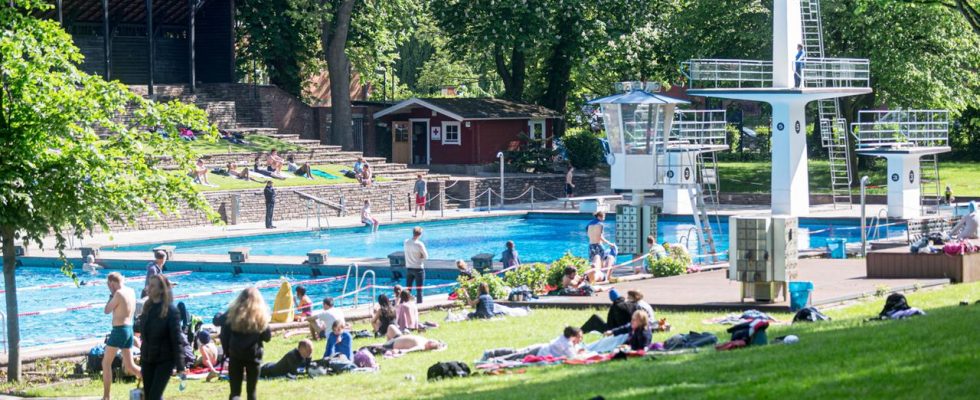fact finder
After the incidents in Berlin, there is a lot of media and political discussion about violence in outdoor pools. A nationwide survey by ARD fact finder shows, however, that the total number of criminal offenses has not increased.
summary court proceedings, passport controls at the entrance: In view of the recent clashes in a Berlin swimming pool, possible consequences are currently being heatedly debated – also throughout Germany.
Politicians like the CDU general secretary Carsten Linnemann say that the violence often comes from young men with a migration background, the AfD calls for tougher deportation regulations. But has the number of crimes committed in swimming pools really increased?
No nationwide numbers
Nationwide numbers of reported crimes in swimming pools cannot be taken from the police crime statistics (PKS) because they are not recorded. A request from ARD fact finder to the interior ministries of the 16 federal states revealed that twelve states have crime figures for the location of swimming pools and bathing areas. However, these figures do not refer to the current year, but to the past, since the statistics are usually published for a whole year.
Since the figures for 2022 are difficult to compare with the two previous years due to the pandemic, 2019 is used as a reference. Compared to this pre-pandemic year, the number of crimes related to swimming pools in 2022 fell by almost 15 percent from 7707 cases to 6589 – at least in the federal states that record the number separately. A total of twelve federal states replied that they could not detect any increase in criminal offenses, in nine of them the number had fallen.
However, more acts of violence have been registered in some federal states – these figures are only reported by seven states. In addition, there were around eleven percent more bathers in German open-air pools in 2019 than in 2022, says Christian Mankel, Managing Director of the German Swimming Association (DGfdB). According to him, riots only take place at a few of the more than 2,800 outdoor pools nationwide. “So the vast majority of outdoor pools are peaceful throughout the season.”
Decrease in criminal offenses in Berlin and NRW
In Berlin, the number of registered crimes in swimming pools fell to 285 in 2022 compared to the years before the pandemic. In 2019 there were still 358, in 2013 even 512. The number of registered acts of violence in 2022 was also below the values of 2019.
Even in the most populous state of North Rhine-Westphalia, both the total number of crimes and the number of violent crimes in outdoor pools fell compared to 2019. “Basically, pools in North Rhine-Westphalia are safe places. Public brawls are still an exception,” said a spokesman for the Ministry of the Interior.
In Brandenburg, fewer criminal offenses and cases of violent crime were also registered in open-air and indoor swimming pools in 2022. According to the police, Brandenburg recorded a further decrease in criminal offenses for the first half of 2023, but these may still be subject to change.
More violent crime in some countries
In Baden-Württemberg and Bavaria, significantly fewer crimes were registered in 2022 than in the years before the pandemic. In Baden-Württemberg, the values in 2022 – excluding the pandemic years – were at their lowest value in the last ten years. However, there was an increase of 41 cases in Baden-Württemberg in 2022 for brutal crimes such as robbery, threats or bodily harm.
According to the Baden-Württemberg Ministry of the Interior, there are signs of an increase in total criminal offenses and, among other things, violent and aggressive crimes in the first half of 2023. However, the ministry writes that an assessment is only “possible to a limited extent” at the time.
In Bavaria, the number of violent crimes rose from 33 to 47 cases in 2022, but remains in the low range. The Bavarian Ministry of the Interior reports: “Although some violent crimes are committed, the number and extent of these can by no means be compared with what is happening in other federal states.”
In Hamburg, the municipal operating company for public swimming pools also reports that there are no such incidents as in Berlin. “We have not noticed any particular accumulation of criminal offenses or misconduct on the part of our guests.” In 2022, the police registered fewer crimes than in the pre-pandemic years, only crude crimes increased by 17 cases to a total of 48 cases.
Slight increase in Lower Saxony and Schleswig-Holstein
In Rhineland-Palatinate and Saarland, the number of registered crimes in 2022 is also below that of the years before the pandemic – although the number of violent crimes in swimming pools increased here. For the first half of 2023, according to the police, an opposite trend can be seen in Rhineland-Palatinate: the total number of crimes is slightly higher than in the same period last year, but there were fewer violent crimes.
In Lower Saxony, a slight increase in crimes was registered in 2022 compared to 2019 – as was Schleswig-Holstein, which also recorded more violent crimes. In Saxony-Anhalt, the figures are only available from 2019 to the first half of 2022, which is why a comparison is only conditionally meaningful. In Mecklenburg-Western Pomerania, the numbers have only been collected since 2020 – at that time, despite the pandemic, there were slightly more crimes and violent crimes recorded than in 2022.
According to the police, no increase in Thuringia and Bremen
No figures are available for the other federal states. The police in Thuringia announced that there were “sporadic” crimes such as theft, trespassing and bodily harm. “However, their frequency is within a range that is usual for publicly accessible places. There is no increase in criminal offenses, especially violent crimes, as in other federal states.”
In Bremen and Saxony, too, the number of crimes committed in swimming pools is not recorded separately. The Bremen police wrote on request that the previous bathing season was running without any major problems. According to the police, there has also been no increase in crime in Bremerhaven. The Hessian Ministry of the Interior did not respond to the request.
youth violence is decreasing
According to Vincenz Leuschner, Professor of Criminology and Sociology at the Berlin School of Economics and Law (HWR), the fact that there is apparently no increase in crimes in swimming pools is consistent with research on youth violence. “Overall, we have been seeing the number of cases fall for years, with a few exceptions,” he says.
In Berlin, youth group violence in the PKS even recorded and reported as a phenomenon in its own right. In 2013, 2856 cases were registered, in 2019 there were 2190. Last year the number of cases recorded was 1873.
According to Leuschner, the fact that violent conflicts occur in swimming pools at all has to do with the general conditions. “It’s an open space, so it’s possible for all sections of the population to visit swimming pools,” he says. Young men in particular often wanted to prove themselves in swimming pools and use the public space as a stage. In addition, people often went to swimming pools in groups.
“This combination of group dynamics and display of masculinity is a basic criminological constant, which can be assumed to make conflicts or problems more likely,” says Leuschner. It is known from research that violence escalates very quickly when groups are involved. The group dynamic is one of the most important factors in lowering the inhibition threshold and using violence. This can also be observed, for example, in connection with football games.
“Prevention and Repression”
Mankel can also confirm this. Escalating group dynamics and the urge for self-expression are often the triggers for violent conflicts. “Employees in the pools suffer from a lack of appreciation and a lack of respect for certain groups just as much as employees in the police, fire brigade and rescue services,” he says. Employees of the Columbiabad in Berlin wrote to the management of the baths in mid-June and drew attention to “the intolerable extent of the circumstances”. This is also confirmed by the Berlin baths companies ARD fact finder-Inquiry.
This is a phenomenon affecting society as a whole, which is also reflected in bathrooms. According to Mankel, the solution to the challenges lies in the right mixture of “prevention and repression”. The DGfdB welcomes the fact that leading political voices in Berlin are calling for tougher action by the state, “because without the support of politicians there will be no improvement”.
However, the DGfdB clearly distances itself from populist demands and generalizations. “We reject this because it does not do justice to the broader debate and completely ignores many well-integrated success stories.”
discourse shift for political agenda setting
The AfD writes about the debate on Twitter: “Fast-track procedures for grabbers and thugs? Outdoor pool perpetrators belong in the deportation plane!” It goes on to say: “The criminals who traveled through the bank, who are up to mischief in outdoor pools and on the street, should be deported without any ifs or buts.” Outdoor pools are “playgrounds for violent criminals”.
“The AfD tries to set the agenda here and uses the debate about the outdoor pools to to achieve stricter deportation regulations and to strengthen resentment,” says Josef Holnburger, Managing Director of the Center for Monitoring, Analysis and Strategy (CeMAS). It is a question of a shift in discourse in order to assert one’s own political ideologies or political demands – regardless of whether the facts indicate this.
Instead of actual facts, perceived truths are played with and individual cases that actually take place are declared a problem for society as a whole. “An attempt is being made to exaggerate the situation and to give the impression that there is a concrete threat from people in swimming pools who are mainly read as migrants, precisely in order to be able to capitalize on it politically,” says Holnburger.
Other actors are also trying to use the swimming pool debate for their own agenda. The right-wing extremist “Compact” magazine, for example, states that the problem is “unhindered mass migration”. “And there’s only one thing that helps: namely, radical remigration, simply deporting those people who can’t behave here on a large scale.” But the police won’t be able to solve it, “because they’re completely soft in Berlin.”
200 posts per day in relevant Telegram channels
The debate about safety in outdoor pools is not new and, according to Holnburger, has been brought to the public every summer for several years, especially from right-wing populist to right-wing extremist milieus. An evaluation by CeMAS shows how often the terms “swimming pool” or “outdoor pool” appear in the 2,820 German-language telegram channels observed by CeMAS from conspiracy ideology or right-wing extremist circles. Currently, 200 posts deal with the topic every day – in 2022 the peak value was 133.
The increase is also due to the fact that the media reported more cases of riots in outdoor pools this year and that many politicians in Berlin in particular spoke out about it. “This leads to a self-reinforcing effect. Even if the media are often defamed by the actors as state media, people still like to quote them if they say what they want to hear,” says Holnburger.


